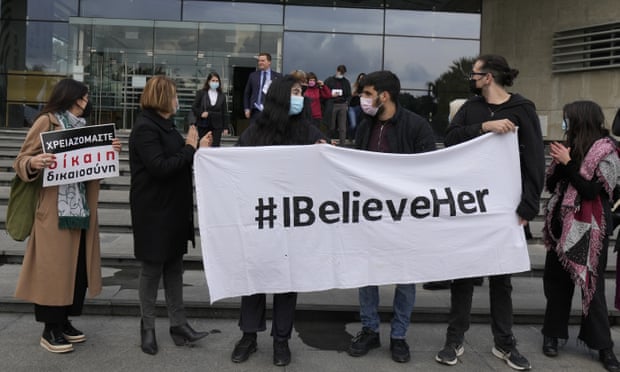The Supreme Court in a decision of historic significance acquitted the young woman who was prosecuted by the authorities and convicted by the Famagusta District Court for an alleged false report of rape in October 2019 in Ayia Napa.
The then 18-year-old and her friends who had just completed their secondary education came to Cyprus in July 2019 to work at the tourist complex Pambos Napa Rocks Hotel Ayia Napa and spend their summer holidays before beginning university. They spotted this opportunity through the pan-European online company Summer Takeover, which promised “a dream job in one of our amazing resorts”.
When they arrived in Cyprus, they were faced with a completely different reality. The facilities were run-down, there was direct and continuous violence and systematic lack of security. Instead of safe living quarters and workplace, she was given a bracelet for 24-hour access to free drinks as a “familiarization mechanism” with the environment. This led with considerable certainty to the disempowerment of young people and eliminate [or, curb?] their resistance to possible violence, substance use and abuse.
It was under these conditions that the young woman was gang-raped by a group of young men on 17/07/2019. On the same day, the police received her report and started investigating the rape. On 27/07/2019, she was called to the police station, allegedly for clarifications, and after 6 hours of interrogation, without a lawyer, she was accused of public mischief on the basis of her “confession” of a false report of rape. The investigation of the rape report was terminated without being completed and, after a criminal case was filed against her, the young woman was found guilty of public mischief by the Famagusta District Court, which sentenced her to 4 months suspended imprisonment.
The Supreme Court in its decision on her appeal:
- Reversed the decision of the court of first instance and acquitted the young woman of the charge of public mischief.
- Ascertained serious shortcomings in the investigation of the case by the prosecuting authorities.
- Ascertained violation of her rights and procedural guarantees during the investigation by the prosecuting authorities and violation of her right to a fair trial.
- Ascertained violation of her right to a fair trial by the court of first instance itself.
The Court’s findings essentially confirm the criticism repeatedly expressed? by NGOs regarding the treatment of women, especially those with migrant background, who turn to the police to report gender-based violence and seek the protection of law enforcement authorities.
We wish to emphasise the significant role that NGOs and civil society organisations at large have played in this case. KISA sided with the victim right from the beginning.
In collaboration with Justice Abroad, we contributed to her legal representation in judicial procedures that had already been put on track against her and in collaboration with other NGOs and women’s rights organizations we worked to raise public awareness on this case and on violence against women in general.
Following the decision of the Supreme Court, KISA asks the prosecuting authorities to:
- Investigate the circumstances and reasons that led to the incomplete investigation and mismanagement of the case by the prosecuting authorities resulting in the victim being charged with false allegations and public mischief.
- Ensure that the report of rape, not fully investigated because of omissions and bad judgement on their part will be fully investigated.
- Evaluate the decision and credibly inform society of all actions to be taken in order to avoid similar maltreatment of victims who complain of gender-based violence in the future.
- Investigate the conditions and context of attracting and “employing” young women to the specific tourist complex group to determine whether they consciously and purposefully aimed to constitute these young women vulnerable to sexual exploitation and violence.
KISA calls on the Judiciary to take all necessary measures to raise the awareness of its members and legal professionals in general on issues of violence against women so that no other woman will face violations of her rights, either as victim, or defendant in the future.
Finally, KISA calls on the Authorities to end the practices of repression and obstruction of NGOs’ work, whose crucial role in defending human rights and vulnerable groups has once again been demonstrated, and to ensure a healthy and favourable framework for their operation and action.
Steering Committee





